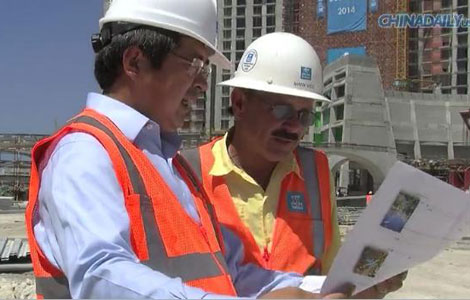Sino-US trade ties are assured
Updated: 2014-10-10 13:10
By Gao Yuan in Beijing(China Daily USA)
|
||||||||
Former US secretary of commerce says that 'period of friction' will pass
China and the United States can work together to reach a free trade agreement in order to remove roadblocks to their economic ties, former US secretary of commerce Carlos Gutierrez said.
"I think one day China and the US will have a free trade agreement," he said in an interview during a recent visit to Beijing.
The 60-year-old chairman of US consultancy firm Albright Stonebridge Group said bilateral and regional FTAs are becoming more prevalent after the World Trade Organization's failed attempt to build a global free trade consortium.
China and the US, the world's biggest economies, are in talks to ink a bilateral investment treaty. According to Gutierrez, such a treaty is usually the first step toward cementing the foundation of an FTA.
Combining bilateral free trade deals with a regional economic package such as the Association of Southeast Asian Nations and the Economic Cooperation Framework Agreement is becoming more accepted by markets around the globe, he said.
Gutierrez served as US secretary of commerce from 2005 to 2009.
Jin Baisong, a researcher with the Chinese Academy of International Trade and Economic Cooperation, said China proposed building a free trade zone several years ago but got a lukewarm response from the US.
"It is good for both sides to launch free trade negotiations. A deeper trade partnership will not only boost the economies of China and the US, but also send a positive message to the world," Jin said.
Former deputy minister of commerce Wei Jianguo was one of the first to advocate a Sino-US FTA. Back in 2012, Wei said free trade between the two nations would help reduce friction and boost both economies.
The US is the top single-state trading partner of China, and China is the second-largest trading partner of the US.
Trade in goods from both sides reached a record high of $521 billion in 2013, according to the Ministry of Commerce.
The Chinese mainland currently trades with 11 markets under FTAs. Its major free trade partners include the Association of Southeast Asian Nations, Pakistan and Switzerland.
FTA talks also are progressing with Australia, Norway, South Korea, Japan and Sri Lanka, according to the Ministry of Commerce.
In addition, China has shown willingness to join the Trans-Pacific Partnership, a proposed regional free trade agreement driven by the US.
Zhu Guangyao, vice-finance minister, said during a trip to Washington on Wednesday that the TPP is "incomplete" without the participation of China, according to a Xinhua News Agency report.
"As China becomes more open, it's very important for us to be integrated into the global trade system," the report quoted Zhu as saying.
The TPP kicked off in 2005 when Gutierrez was secretary of commerce. Current members of the agreement include the US, Australia, Canada, Chile, Japan, Malaysia, Mexico and Singapore. China was excluded during the initial round of talks.
China stepped up antitrust efforts, which has raised fears the investigations could hurt Sino-US ties and create hurdles toward reaching bilateral economic agreements.
Chrysler Group, Microsoft Corp and Qualcomm Corp are among the US multinationals that have been involved in high-profile anti-monopoly investigations.
But the majority of US corporate executives and government officials are unsure about how China's 6-year-old Antitrust Law is being applied, Gutierrez said. "There is a sense that perhaps the law is an aggressive application."
Chinese officials such as Premier Li Keqiang have said on many occasions that the probes are to ensure market fairness and do not target any specific group of companies.
Gutierrez said China and the US have always tried to solve problems that get in the way of their economic ties. "There isn't any reason to be pessimistic about the future of US-China economic relations," he said.
"I think China and the US are going through a period of friction and misunderstanding now, but I wouldn't consider the current state of things to be a permanent status quo," Gutierrez said, adding that overall, Sino-US relations are in good shape and will only get better.
The two economies are complementary and have huge potential in cooperation, he said, naming shale gas as a sector where the two countries could work together to herald an energy revolution.
gaoyuan@chinadaily.com.cn
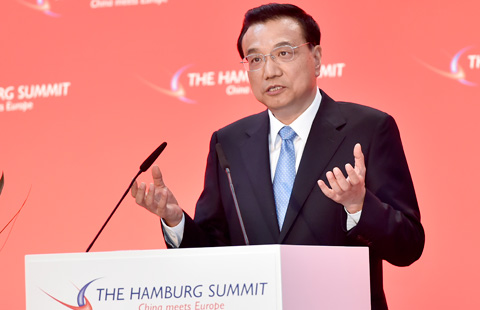
 Li says focus is on long-term growth
Li says focus is on long-term growth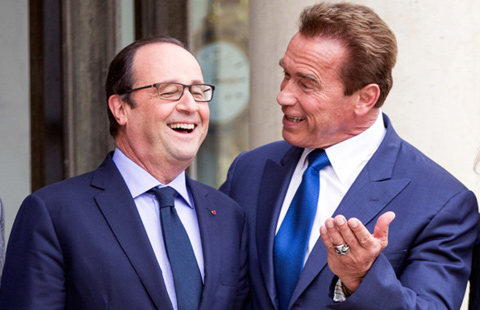
 Hollande meets with Arnold Schwarzenegger in Paris
Hollande meets with Arnold Schwarzenegger in Paris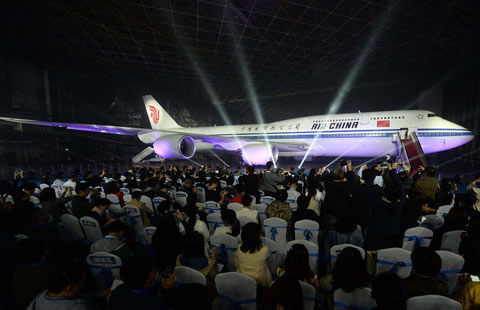
 Air China's first Boeing 747-8 set to take off
Air China's first Boeing 747-8 set to take off
 Malala's hometown celebrates her Nobel Peace Prize
Malala's hometown celebrates her Nobel Peace Prize
 Hello Kitty, happy 40th birthday!
Hello Kitty, happy 40th birthday!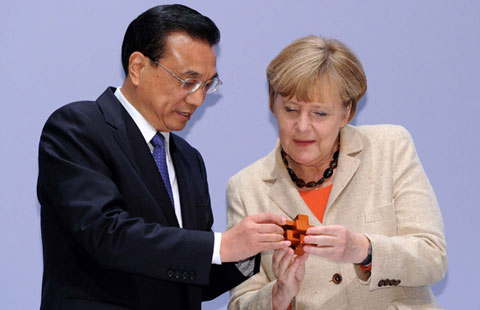
 Li pins high hopes on China-Germany cooperation
Li pins high hopes on China-Germany cooperation
 Call of the wild
Call of the wild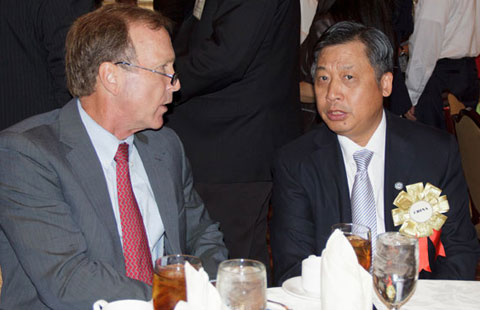
 China's trade with Texas taking off
China's trade with Texas taking off
Most Viewed
Editor's Picks

|

|

|

|

|

|
Today's Top News
China faces risks in Brazil's energy sector
Premier hails Hamburg's role in cooperation
Premier's visit takes China-Germany ties to new height
Li says focus is on long-term growth
China plans panda park
Former senior CPC official in Jiangsu under probe
China needs more than GDP
Sino-US trade ties are assured
US Weekly

|

|

